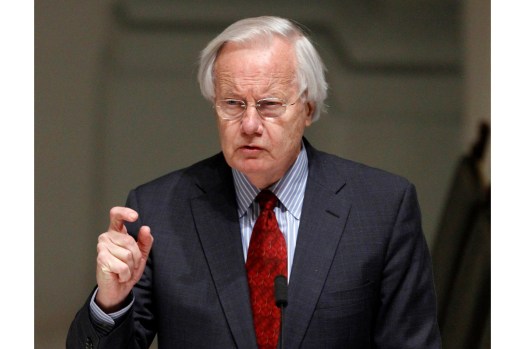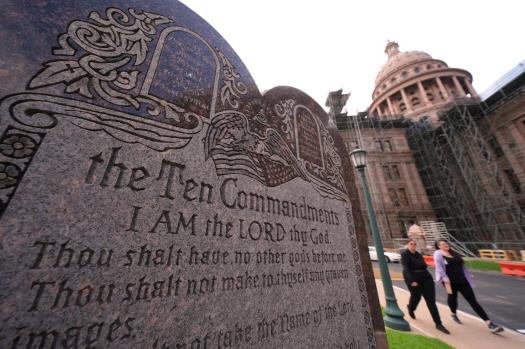By AP Television Writer FRAZIER MOORE
NEW YORK (AP) At the age of 91, Bill Moyers, the former White House press secretary who rose to prominence as one of television’s most renowned journalists by skillfully illuminating a world of ideas through a visual medium, passed on Thursday.
According to lifelong friend Tom Johnson, who was Moyer’s secretary during the administration of Lyndon B. Johnson and the former CEO of CNN, Moyer passed away in a hospital in New York City. Moyers’ reason of death was not mentioned by him.
Moyer’s career included positions as a young Baptist pastor, deputy director of the Peace Corps, Johnson’s press secretary, newspaper publisher, chief correspondent for CBS Reports, and senior news analyst for The CBS Evening News.
Related Articles
-
Super Bowl halftime performer arrested after police say he held flag stating Sudan and Free Gaza
-
Anna Wintour is seeking a new Vogue editor-in-chief but will maintain editorial control
-
Prosecutors tell judge government plans to initiate removal proceedings against Kilmar Abrego Garcia
-
A purpose in this world : Older adults fear elimination of program that helps them find work
-
As ICE raids intensify, how do employers know if their workers are legal?
However, Moyers created some of TV’s most thought-provoking and challenging shows for public television. He proved comfortable discussing topics ranging from religion to environmental damage, from drug addiction to media consolidation, and from government corruption to modern dance in hundreds of hours of PBS shows.
In 1988, Moyers wrote a book titled The Secret Government and created a film on the Iran-Contra affair during the Reagan administration. Joseph Campbell and the Power of Myth, a collection of six one-hour conversations with the well-known religious scholar, inspired audiences at that time. The book that went with it became a best-seller.
His television interviews with poet Robert Bly nearly started the Men’s Movement in the 1990s, and his Healing and the Mind series in 1993 had a significant influence on medical education and the medical community.
Moyers became an expert at shooting subject and interviewer talking heads in a medium that is said to detest such images. He once gave the following explanation: Are the talking heads thinking individuals and thinking minds? Are they entertaining to watch? The human face, in my opinion, has the most intriguing production value.
Moyers was a humanist who examined the world with a cool, collected viewpoint, regardless of the topic, and he displayed what one person described as a delicate, probing approach in the original Texas accent he never lost.
Because of his connections to Johnson and public television, as well as his unrestrained approach to investigative journalism, he was attacked as a liberal by some quarters. He didn’t necessarily deny the designation.
In a 2004 radio interview, he declared, “I’m an old-fashioned liberal when it comes to being open and interested in other people’s ideas.” However, Moyers favored calling himself a citizen journalist who works autonomously and outside of the system.
In an interview with The Associated Press in 2007, he claimed that public television (as well as his self-funded production firm) afforded him the freedom to open the discourse on democracy to everyone.
He once remarked, “I believe my colleagues in commercial television are gifted and committed journalists, but they have chosen to work in a corporate mainstream that trims their talent to fit the corporate nature of American life.” Furthermore, in a profit-driven setting, you are not rewarded for speaking the harsh truth about America.
In addition to receiving more than 30 Emmys, Moyers received three George Polks, eleven George Foster Peabody awards, and twice the Alfred I. duPont-Columbia University Gold Baton Award for career excellence in broadcast journalism. He was admitted into the Television Hall of Fame in 1995.
Billy Don Moyers was born on June 5, 1934, in Hugo, Oklahoma. His father was a dirt farmer-truck driver, and the family later relocated to Marshall, Texas. His path to journalism began in high school.
I was too little to play football, but I wanted to. However, he added, I discovered that by publishing sports articles in the school newspaper, the players were always lining up at the newsstand to read what I had to say.
At sixteen, he began working for the Marshall News Messenger. He removed the y from his name after deciding that Bill Moyers was a better byline for a sportswriter.
He obtained a master’s degree in divinity from Southwestern Baptist Theological Seminary after graduating from the University of Texas. He later concluded that his call to the ministry was the wrong number, despite having been ordained and serving as a part-time preacher at two congregations.
He started dating Johnson while he was a college student, writing the senator at the time to volunteer to help with his reelection campaign in 1954. He was given a summer job by Johnson, who was impressed. In the early 1960s, he returned to Johnson’s employment as a personal assistant. He then spent two years with the Peace Corps, rising to the position of deputy director.
Moyers was in Austin, assisting with the presidential trip, on the day that John F. Kennedy was slain in Dallas. Alongside newly minted President Johnson, for whom he served in a number of capacities over the following years, including press secretary, he returned to Washington on Air Force One.
During his time as presidential press secretary, Moyers worked to improve the declining rapport between Johnson and the press. However, the toll of the Vietnam War caused Moyers to step down in December 1966.
He later said, “We had become a war government, not a reform government, and there was no creative role left for me under those circumstances,” in reference to his exit from the White House.
He acknowledged that he could have been overly enthusiastic in his justification of our policies and expressed regret for scolding reporters like CBS’s Morley Safer and Pulitzer Prize winner Peter Arnett, who was then an AP special correspondent, for their coverage of the war.
This report was written by former Associated Press reporter Robert Monroe and AP writer Dave Bauder. In 2017, Moore stepped down from the AP.












